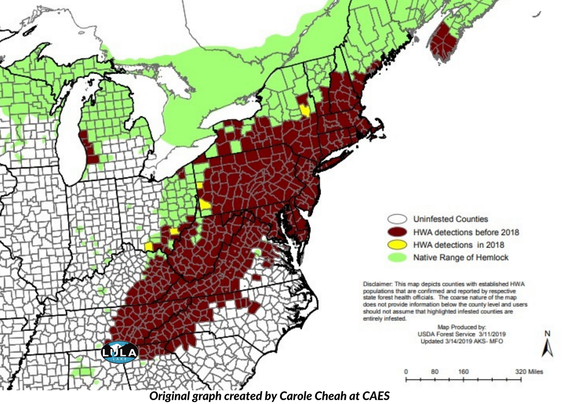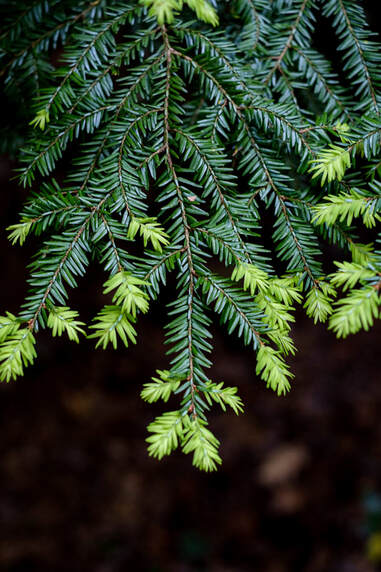Hemlock Forests and the Woolly Adelgid Problem
You can save a Hemlock tree with a $10 donation! Your support allows Lula Lake to treat (1) Hemlock tree against woolly adelgid infestation, a pesky insect threatening the extinction of Hemlock forests.
WHAT'S GOING ON?
Not unlike most forests along the East Coast, Lula Lake's Core Preserve and surrounding lands were affected by the hemlock woolly adelgid (HWA), an insect that brought Hemlock trees to near extinction. Beginning in 2013, we partnered with the Georgia Forestry Commission to identify affected areas of the our Hemlock forests. We began treating over 12,000 trees along Rock Creek and Bear Creek in 2014.
THIS IS WHERE YOU CAN HELP!
Treatments last for 5-7 years, and it is time to once again save our Hemlock forests with a second round of treatments. Hemlock treatments are costly, but with your $10 donation we can raise $7,000 to begin more treatments in 2021. These treatments are critical to the health and sustainability of our Hemlock forests. In addition to traditional treatments, we are working with biological control methods to help create a more sustainable long-term solution. If you are passionate about Hemlock preservation, please consider helping us save a tree in our Hemlock forests.
For every $10 donated, you can help Lula Lake treat (1) Hemlock tree for woolly adelgid infestation.
WHY SAVE HEMLOCK FORESTS?
Doing nothing is simply not an option. The hemlock woolly adelgid (HWA) is an invasive species that kills all trees it infests if left untreated. Infestations threat the ecology of our protected lands and community. Doing nothing leaves thousands upon thousands of acres at risk of becoming wiped out.
Not unlike most forests along the East Coast, Lula Lake's Core Preserve and surrounding lands were affected by the hemlock woolly adelgid (HWA), an insect that brought Hemlock trees to near extinction. Beginning in 2013, we partnered with the Georgia Forestry Commission to identify affected areas of the our Hemlock forests. We began treating over 12,000 trees along Rock Creek and Bear Creek in 2014.
THIS IS WHERE YOU CAN HELP!
Treatments last for 5-7 years, and it is time to once again save our Hemlock forests with a second round of treatments. Hemlock treatments are costly, but with your $10 donation we can raise $7,000 to begin more treatments in 2021. These treatments are critical to the health and sustainability of our Hemlock forests. In addition to traditional treatments, we are working with biological control methods to help create a more sustainable long-term solution. If you are passionate about Hemlock preservation, please consider helping us save a tree in our Hemlock forests.
For every $10 donated, you can help Lula Lake treat (1) Hemlock tree for woolly adelgid infestation.
WHY SAVE HEMLOCK FORESTS?
Doing nothing is simply not an option. The hemlock woolly adelgid (HWA) is an invasive species that kills all trees it infests if left untreated. Infestations threat the ecology of our protected lands and community. Doing nothing leaves thousands upon thousands of acres at risk of becoming wiped out.
As recent as 2018, the HWA has spread rampantly throughout the eastern United States. Lula Lake Land Trust is working to ensure the HWA will not wipe out our Hemlock forests and spread throughout Georgia, Tennessee, and Alabama.
Lula Lake Land Trust has been committed to preserving the natural and historic landscapes surrounding Rock Creek and Bear Creek since 1994. It is our goal to ensure both the habitat and environment are healthy. The long-term sustainability of land is critical to the organization, and Lula Lake is committed to ensuring thriving native species, clean waterways, and reforestation.
Lula Lake Land Trust has been committed to preserving the natural and historic landscapes surrounding Rock Creek and Bear Creek since 1994. It is our goal to ensure both the habitat and environment are healthy. The long-term sustainability of land is critical to the organization, and Lula Lake is committed to ensuring thriving native species, clean waterways, and reforestation.



